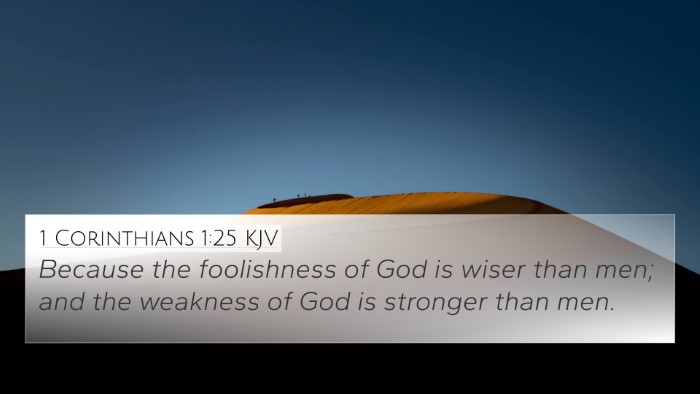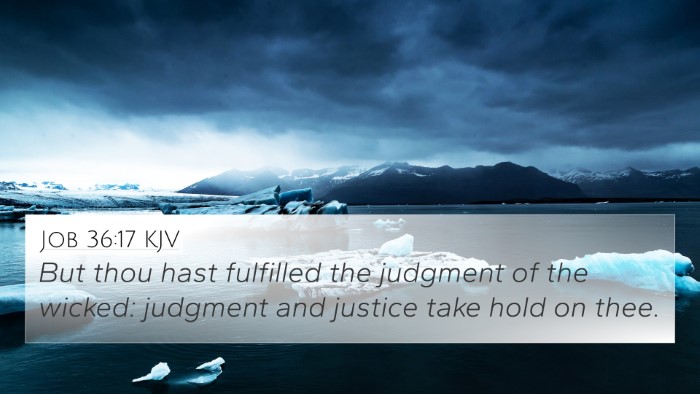Understanding Job 9:19
Bible Verse: Job 9:19 - "If it be a matter of strength, behold, he is strong: and if of judgment, who shall set me a time to plead?"
This verse from Job captures the essence of human limitation in the face of divine power and judgment. It highlights Job's recognition of God's sovereignty and the futility of arguing against God's will.
Summary of Insights
Job expresses a deep awareness of the might and authority of God. The verse invites contemplation on the nature of strength and justice, presenting the idea that no one can oppose God without facing dire consequences.
Commentary Insights
- Matthew Henry: Henry emphasizes Job's submission to God's power. Job acknowledges that God possesses ultimate strength, and in matters of judgment, humans cannot dictate terms or timelines to the Almighty. This recognition leads to a necessary humility before God.
- Albert Barnes: Barnes focuses on the rhetorical questions posed by Job, illustrating his despair yet deep respect for God's authority. He notes that Job feels overwhelmed, contemplating who can initiate a dialogue with God when God is the ultimate judge and enforcer of justice.
- Adam Clarke: Clarke highlights the existential implications of this verse, interpreting Job's acknowledgment of his position in contrast to God’s omnipotence. He suggests that Job's struggle portrays the human condition of seeking understanding amid unexplainable suffering.
Thematic Connections and Cross-References
Understanding Job 9:19 is enriched by examining related scripture passages that explore themes of divine strength, human humility, and the search for justice. Here are some key cross-references:
- Psalm 62:11: "God has spoken once; twice have I heard this; that power belongs to God." - Similar acknowledgment of God's sovereignty.
- Isaiah 40:28: "Hast thou not known? hast thou not heard, that the everlasting God, the Lord, the Creator of the ends of the earth, fainteth not, neither is weary?" - Emphasis on God’s unending strength.
- Romans 9:20-21: "Nay but, O man, who art thou that repliest against God? Shall the thing formed say to him that formed it, Why hast thou made me thus?" - Discussion on the human position relative to God’s will.
- Job 10:2: "I will say unto God, Do not condemn me; show me wherefore thou contendest with me." - Job’s plea underscores the tension between divine judgment and human understanding.
- 2 Corinthians 12:9: "My grace is sufficient for thee: for my strength is made perfect in weakness." - God's strength in contrast to human frailty.
- Philippians 2:10: "That at the name of Jesus every knee should bow, of things in heaven, and things in earth, and things under the earth;" - Affirmation of God’s authority over all creation.
- Isaiah 45:9: "Woe unto him that striveth with his Maker! Let the potsherd strive with the potsherds of the earth." - A warning against questioning God's decisions.
Practical Applications
Job 9:19 teaches valuable lessons about humility, trust, and the nature of God's authority. Here are some applications for deeper engagement with the text:
- Embrace Humility: Just as Job recognized his own limitations compared to God's power, we must cultivate humility in our own lives.
- Seek Understanding: Strive to grasp the complexities of divine justice, particularly in times of suffering and uncertainty.
- Trust in God's Sovereignty: Acknowledge that God has a plan, and although we may not see the full picture, trusting in His judgment provides solace during trials.
Conclusion
Job 9:19 serves as a poignant reminder of the vast difference between divine strength and human frailty. By reflecting on this verse and its cross-references, believers can gain a deeper understanding of God's majesty and cultivate a posture of reverence and humility in their lives.
Further Study on Cross-Referencing
Exploring connections between Bible verses enriches our understanding of Scripture. Here are some tools and methods for effective cross-referencing:
- Bible Concordance: Utilizing a concordance can help identify specific words and their occurrences throughout Scripture.
- Cross-Reference Bible Study: Engaging with materials that offer cross-references facilitates a deeper exploration of biblical themes.
- Comparative Bible Verse Analysis: This method allows for direct comparison of verses that touch upon similar themes or topics.












